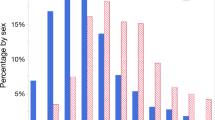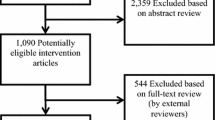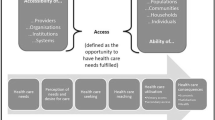Abstract
Families often express difficulty to their providers and request guidance regarding the task of communicating with children about potential adult-onset inherited cancer risks. This disclosure is often complicated by the parent’s ongoing adjustment to their mutation status, guilt at potential transmission of the mutation to the child, concern over inciting distress in children, and the varied capacities of children in the home to understand genetic information. Providers often do not have adequate resources to support or facilitate disclosure of genetic test results to children. Optimally, communication about inherited cancer risk is an open, ongoing process within the family. We recommend that parents tailor conversations to the child’s developmental, cognitive, emotional, and behavioral abilities to support comprehension. Based on well-established theories of child development, empirical research on family communication of hereditary cancer risk, and clinical counseling experience, we offer recommendations for parental disclosure of genetic risk to children, case examples with critical discussion of relevant topics, common child questions with sample scripted responses, and additional printed and online resources.





Similar content being viewed by others
Change history
23 July 2018
The original article [1] was initially published with the following list of authors: Allison Werner-Lin, Shana L. Merrill, and Amanda C. Brandt. This author list is now corrected as follows: Allison Werner-Lin, Shana L. Merrill, Amanda C. Brandt, Rachel E. Barnett, & Ellen T. Matloff.
Notes
Parents and/or children who seek out information online about rates of cancer in children will find it is the leading or second leading cause of death in children in the USA. Yet pediatric cancer is also exceedingly rare (SEER 2016).
References
Aktan-Collan, K. I., Kääriäinen, H. A., Kolttola, E. M., Pylvänäinen, K., Järvinen, H. J., Haukkala, A. H., & Mecklin, J. P. (2011). Sharing genetic risk with next generation: mutation-positive parents’ communication with their offspring in Lynch syndrome. Familial Cancer, 10(1), 43–50.
Arnett, J. J. (2000). Emerging adulthood: a theory of development from the late teens through the twenties. American Psychologist, 55(5), 469.
Arnett, J. J., & Galambos, N. L. (2003). Culture and conceptions of adulthood. New Directions for Child and Adolescent Development, 2003(100), 91–98.
Bradbury, A. R., Dignam, J. J., Ibe, C. N., Auh, S. L., Hlubocky, F. J., Cummings, S. A., et al. (2007). How often do BRCA mutation carriers tell their young children of the family's risk for cancer? A study of parental disclosure of BRCA mutations to minors and young adults. Journal of Clinical Oncology, 25(24), 3705–3711.
Bradbury, A. R., Patrick-Miller, L., Pawlowski, K., Ibe, C. N., Cummings, S. A., Hlubocky, F., et al. (2009). Learning of your parent's BRCA mutation during adolescence or early adulthood: a study of offspring experiences. Psycho-Oncology, 18(2), 200–208.
Bradbury, A. R., Patrick-Miller, L., Egleston, B. L., Olopade, O. I., Daly, M. B., Moore, C. W., et al. (2012). When parents disclose BRCA1/2 test results: their communication and perceptions of offspring response. Cancer, 118(13), 3417–3425.
Bronfenbrenner, U. (2009). The ecology of human development. Harvard University Press.
Brown, L. M., & Gilligan, C. (1993). Meeting at the crossroads: women’s psychology and girls' development. Feminism & Psychology, 3(1), 11–35.
Census, U. S. (2009). Estimated median age at first marriage, by sex: 1890 to 2009. Washington, DC: United States Census Bureau.
Christ, G. H., Siegel, K., Freund, B., Langosch, D., Hendersen, S., Sperber, D., & Weinstein, L. (1993). Impact of parental terminal cancer on latency-age children. American Journal of Orthopsychiatry, 63(3), 417.
Compas, B. E., Worsham, N. L., Ey, S., & Howell, D. C. (1996). When mom or dad has cancer: II. Coping, cognitive appraisals, and psychological distress in children of cancer patients. Health psychology, 15(3), 167.
Daly, M. B., Montgomery, S., Bingler, R., & Ruth, K. (2016). Communicating genetic test results within the family: is it lost in translation? A survey of relatives in the randomized six-step study. Familial Cancer, 15(4), 697–706.
Davies, D. (2010). Child development: a practitioner’s guide. Guilford Press.
Davis, D. S. (1997). Genetic dilemmas and the child’s right to an open future. Hastings Center Report, 27(2), 7–15.
Doka, K. (1995). Talking to children about illness. In K. J. Doka (Ed.), Children mourning, mourning children (pp. 31–39). Washington, DC: Hospice Foundation of America.
Erickson, E. H. (1993). Childhood and society. WW Norton & Company.
Etchegary, H., & Fowler, K. (2008). They had the right to know.’ Genetic risk and perceptions of responsibility. Psychology and Health, 23(6), 707–727.
Fogarty, J. A. (2000). The magical thoughts of grieving children: Treating children with complicated mourning and advice for parents. Baywood Publishing Company.
Forrest, K., Simpson, S. A., Wilson, B. J., Van Teijlingen, E. R., McKee, L., Haites, N., & Matthews, E. (2003). To tell or not to tell: barriers and facilitators in family communication about genetic risk. Clinical Genetics, 64(4), 317–326.
Forrest, L. E., Curnow, L., Delatycki, M. B., Skene, L., & Aitken, M. (2008). Health first, genetics second: exploring families’ experiences of communicating genetic information. European Journal of Human Genetics, 16(11), 1329–1335.
Forrest, G., Plumb, C., Ziebland, S., & Stein, A. (2009). Breast cancer in young families: a qualitative interview study of fathers and their role and communication with their children following the diagnosis of maternal breast cancer. Psycho-Oncology, 18(1), 96–103.
Gilligan, C. (1982). In a different voice. Harvard University Press.
Gilster, P., & Glister, P. (1997). Digital literacy. New York: Wiley Computer Pub.
Goldman, L. (2002). The assumptive world of children. In J. Kauffman (Ed.), Loss of the assumptive world: a theory of traumatic loss. The series in trauma and loss (pp. 193–202). Brunner-Routledge: New York, NY, US.
Gray, N. J., Klein, J. D., Noyce, P. R., Sesselberg, T. S., & Cantrill, J. A. (2005). Health information-seeking behaviour in adolescence: the place of the internet. Social Science & Medicine, 60(7), 1467–1478.
Hamilton, J. G., Mays, D., DeMarco, T., & Tercyak, K. P. (2016). Modeling the dyadic effects of parenting, stress, and coping on parent–child communication in families tested for hereditary breast-ovarian cancer risk. Familial Cancer, 15(4), 513–522.
Hesse, B. W., Arora, N. K., & Khoury, M. J. (2012). Implications of internet availability of genomic information for public health practice. Public Health Genomics, 15(3–4), 201–208.
Hoskins, L. M., & Werner-Lin, A. (2013). A multi-case report of the pathways to and through genetic testing and cancer risk management for BRCA1/2 mutation positive women aged 18-25. Journal of Genetic Counseling, 22(1), 27–38.
Keenan, K. F., van Teijlingen, E., McKee, L., Miedzybrodzka, Z., & Simpson, S. A. (2009). How young people find out about their family history of Huntington’s disease. Social Science & Medicine, 68(10), 1892–1900.
Koopman, H. M., Baars, R. M., Chaplin, J., & Zwinderman, K. H. (2004). Illness through the eyes of the child: the development of children’s understanding of the causes of illness. Patient Education and Counseling, 55(3), 363–370.
McConkie-Rosell, A., Heise, E. M., & Spiridigliozzi, G. A. (2009). Genetic risk communication: experiences of adolescent girls and young women from families with fragile X syndrome. Journal of Genetic Counseling, 18(4), 313.
Metcalfe, A., Plumridge, G., Coad, J., Shanks, A., & Gill, P. (2011). Parents’ and children’s communication about genetic risk: a qualitative study, learning from families’ experiences. European Journal of Human Genetics, 19(6), 640–646.
Miller, S. M. (1995). Monitoring versus blunting styles of coping with cancer influence the information patients want and need about their disease. Implications for cancer screening and management. Cancer, 76(2), 167–177.
NCCN Guidelines Version 1.2012 (2012) Genetic/familial high-risk assessment: Breast and ovarian cancer. http://www.nccn.org/professionals/physician_gls/pdf/genetics_screening.pdf. Accessed 1 November 2012.
Nutbeam, D. (2000). Health literacy as a public health goal: a challenge for contemporary health education and communication strategies into the 21st century. Health Promotion International, 15(3), 259–267.
Patenaude, A. F., & Schneider, K. A. (2017). Issues arising in psychological consultations to help parents talk to minor and young adult children about their cancer genetic test result: a guide to providers. Journal of Genetic Counseling, 26(2), 251–260.
Patenaude, A. F., DeMarco, T. A., Peshkin, B. N., Valdimarsdottir, H., Garber, J. E., Schneider, K. A., et al. (2013). Talking to children about maternal BRCA1/2 genetic test results: a qualitative study of parental perceptions and advice. Journal of Genetic Counseling, 22(3), 303–314.
Piaget, J. (2000). Piaget’s theory of cognitive development. Childhood Cognitive Development: The Essential Readings, 33–47.
Plumridge, G., Metcalfe, A., Coad, J., & Gill, P. (2011). Parents’ communication with siblings of children affected by an inherited genetic condition. Journal of Genetic Counseling, 20(4), 374–383.
Rideout, V. (2001). Generation Rx.com: how young people use the internet for health information. Menlo Park, CA: Kaiser Family Foundation.
Rosenstock, I. M., Strecher, V. J., & Becker, M. H. (1988). Social learning theory and the health belief model. Health Education Quarterly, 15(2), 175–183.
Rowland, E., & Metcalfe, A. (2013). Communicating inherited genetic risk between parent and child: a meta-thematic synthesis. International Journal of Nursing Studies, 50(6), 870–880.
Schwartz, S. J., Côté, J. E., & Arnett, J. J. (2005). Identity and agency in emerging adulthood: two developmental routes in the individualization process. Youth & Society, 37(2), 201–229.
Surveillance, Epidemiology, and End Results (SEER) Program Populations (2016) (www.seer.cancer.gov/popdata), National Cancer Institute, DCCPS, Surveillance Research Program, Surveillance Systems Branch, released March 2016.
Tercyak, K. P., Peshkin, B. N., DeMarco, T. A., Brogan, B. M., & Lerman, C. (2002). Parent–child factors and their effect on communicating BRCA1/2 test results to children. Patient Education and Counseling, 47(2), 145–153.
Ulph, F., Townsend, E., & Glazebrook, C. (2009). How should risk be communicated to children: a cross-sectional study comparing different formats of probability information. BMC Medical Informatics and Decision Making, 9(1), 26.
Wakefield, C. E., Hanlon, L. V., Tucker, K. M., Patenaude, A. F., Signorelli, C., McLoone, J. K., & Cohn, R. J. (2016). The psychological impact of genetic information on children: a systematic review. Genetics in Medicine, 18(8), 755–762.
Werner-Lin, A. (2008). Formal and informal support needs of young women with BRCA mutations. Journal of Psychosocial Oncology, 26(4), 111–133.
Werner-Lin, A., Biank, N. M., & Rubenstein, B. (2010). There’s no place like home: preparing children for geographical and relational attachment disruptions following parental death to cancer. Clinical Social Work Journal, 38(1), 132–143.
Werner-Lin, A., Hoskins, L. M., Doyle, M. H., & Greene, M. H. (2012). ‘Cancer doesn’t have an age’: genetic testing and cancer risk management in BRCA1/2 mutation-positive women aged 18–24. Health, 16(6), 636–654.
Acknowledgements
The authors acknowledge Ellen Matloff for inspiring the need for this work. The authors also acknowledge Victoria Groner for preparing the diagrams, examining resource materials, and supporting the literature review.
Author information
Authors and Affiliations
Corresponding author
Ethics declarations
Conflict of Interest
Allison Werner-Lin, Shana L. Merrill, and Amanda C. Brandt declare that they have no conflict of interest.
Appendix
Appendix
Rights and permissions
About this article
Cite this article
Werner-Lin, A., Merrill, S.L. & Brandt, A.C. Talking with Children About Adult-Onset Hereditary Cancer Risk: A Developmental Approach for Parents. J Genet Counsel 27, 533–548 (2018). https://doi.org/10.1007/s10897-017-0191-7
Received:
Accepted:
Published:
Issue Date:
DOI: https://doi.org/10.1007/s10897-017-0191-7




